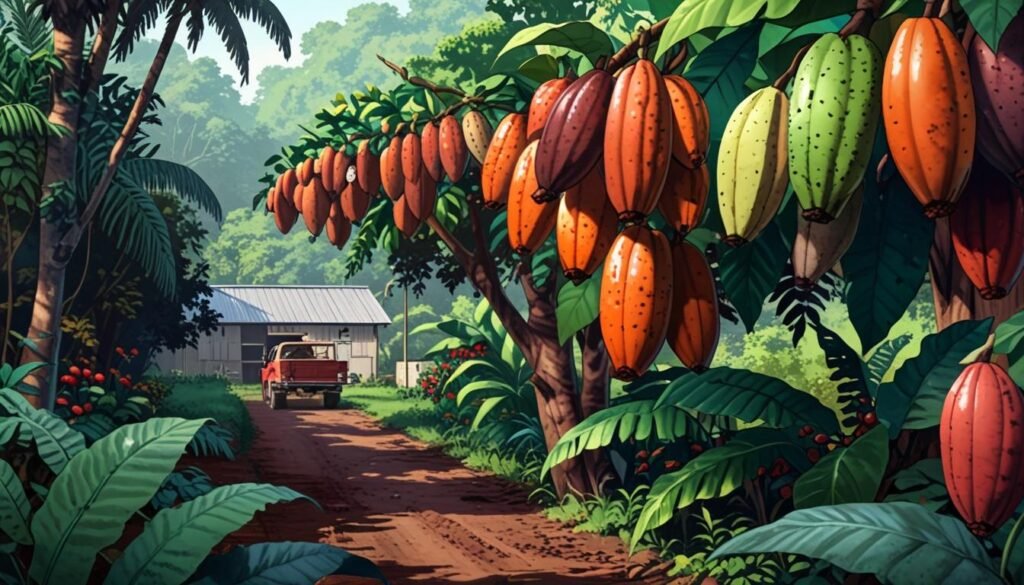**USA**: Recent U.S. tariffs on cocoa and raw materials are reshaping the chocolate industry, increasing costs and prompting producers like MrBeast’s Feastables to rethink strategies. The decisions, influenced by economic pressures, raise ethical concerns regarding sourcing and sustainability in a challenging environment.
Recent changes in U.S. trade policies, particularly the imposition of tariffs on cocoa and other essential raw materials, have significantly reshaped the landscape of the chocolate industry. Companies are now grappling with the implications of these tariffs, which have led to increased production costs and altered strategies for supply chains.
The tariffs, introduced during the Trump administration, impose a levy of over 20% on imported cocoa, which is predominantly sourced from West Africa—Côte d’Ivoire and Ghana account for more than 60% of the global cocoa supply. As the U.S. relies almost entirely on imported cocoa due to minimal domestic production, these tariffs represent a considerable financial challenge for chocolate manufacturers. Cocoa prices have already soared to nearly $10,000 per metric ton in 2025, a rise attributed to climate change and crop diseases, further complicating the situation for these companies.
MrBeast, whose real name is Jimmy Donaldson, has been vocal about the impact of these tariffs on his chocolate brand, Feastables. Speaking to the Utica Phoenix, he explained that these tariffs have made it “way cheaper” to produce his chocolate bars outside the United States. This sentiment reflects a larger trend in the industry where manufacturers are compelled to reassess their production strategies in light of the financial burden these tariffs impose.
The situation is exacerbated by the high costs of other key ingredients such as sugar and milk. The U.S. maintains stringent import quotas and tariffs on sugar to protect domestic farmers, leading to prices that exceed global averages. Concurrently, rising inflation and increased feed costs have hiked the price of milk, creating a challenging environment for chocolate producers who depend on these materials.
As a result of these economic pressures, many companies are relocating production to countries with lower labour costs and more favourable trade agreements. For instance, companies like Feastables find themselves contending with higher U.S. wages compared to cocoa-producing countries, where workers earn significantly less. MrBeast pointed out that the tariffs create a “random price hike” that makes maintaining domestic production “brutal”.
However, the decision to move production abroad is not without its ethical considerations. Feastables prides itself on using fair trade-certified cocoa and ensuring that farmers receive a living wage. The rising cost of tariffs forces companies to make difficult choices that could compromise their ethical sourcing commitments. While larger enterprises may have the flexibility to absorb increased costs or shift production, smaller chocolate businesses, including specialty shops, may find it more difficult to navigate these challenges, potentially leading to price increases or a reduction in product offerings.
Moreover, there are broader implications for ethical sourcing and environmental sustainability. If cost-cutting becomes the priority, there is a risk that practices may deteriorate, potentially leading to the increased exploitation of cocoa farmers and a degradation of the environments from which the cocoa is sourced.
In light of these developments, there have been calls for policymakers to reconsider the impact of tariffs on industries dependent on imported raw materials. Possible targeted exemptions for cocoa and other crucial ingredients could alleviate financial burdens on chocolate manufacturers.
The shifts within the chocolate industry due to U.S. tariffs highlight the intricate connections between trade policy, production costs, and ethical sourcing. As the industry navigates these complex challenges, both consumers and producers are faced with the question of how best to advocate for sustainable practices while grappling with the realities of the current economic landscape.
Source: Noah Wire Services

